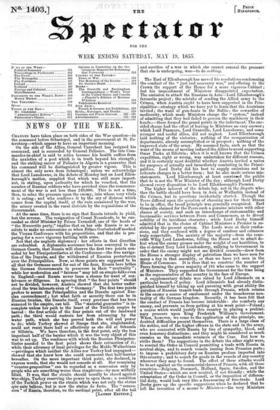NEWS OF THE WEEK.
CHANGES have taken place on both sides of the War question—in the command before Sebastopol, and in the government at St. Pe- tersburg—which appear to have an important meaning.
On the side of the Allies, General Canrobert has resigned his command, and is succeeded by General Pelissier. The late Com- mander-in-chief is said to retire because his health suffers from the anxieties of a post which is in truth beyond his strength ; and the striking career of Pelissier in Algeria is a guarantee that
his command will be distinguished by greater vigour. This is almost the only news from Sebastopol unless we acknowledge that Lord Lansdowne, in the debate of Monday last on Lord Ellen- borough's motion, supplied that which was still more import- ant, in stating, upon authority for which he vouched, that the number of Russian soldiers who have perished since the commence- ment of the war is not less than 240,000. This is not a time, then, to relax the pressure upon the enemy, into whose very vitals it is eating ; and who confesses it by the cry of distress which comes from the capital itself, at the ruin occasioned by the war, the misery created in the rural districts by the requisitions of the Government.
- At the same time, there is no sign that Russia intends to yield, bat the reverse. The resignation of Count Nesselrode, to be suc- ceeded as chief Minister-by Prince Yermaloff, one of the heads of "the Muscovite party," implies that on her side Russia is as re- solute to make no concessions as when Prince Gortschakoff mocked the Vienna Conference with his propositions, and that she is pre- paring for a more vigorous battling with arms. Not that she neglects diplomacy : her efforts in that direction are redoubled. A. diplomatic assurance has been conveyed to the German Courts, that Russia will observe the first two points con- oeded by her Plenipotentiaries at the Conference—the free naviga- tion of the Danube, and the withdrawal of Russian protectorate over the Principalities. Now, as these points are supposed to be all that the Germans oared for out of the four, Russia here bribes the German Governments to persevere in their " neutrality "; while her moderation and " fairness " may tell on simple folks even in England—and Russia never loses a chance for want of con- trivance or diligence. In agreeing that "the four points" should not be divided, however, Austria showed that she better under- stood the true interests even of "Germany." The first two points profess to secure the Principalities and the Danube against Rus- sian encroachment • but what faith or security there can be in Russian treaties, the Danube itself, every province that has been annexed to the empire, can tell. The "material guarantee" is in- complete unless her path to the heart of the Turkish empire be barred : the first article of the fear points out off the landward path ; the third would restrain her from advancing by the water path, which she has proved both the will and power to do ; while Turkey showed at Sinope that she, singlehanded, oould not resist there half so effectively as she did at Sohumla or Silistria. We have therefore, in the first point, only the less important half of the barrier which it was the very object of this war to set up. The readiness with which the Russian Plenipoten- tiaries acceded to the first point shows their estimation of it; while their advocacy of local privileges for the Moldo-Wallachians —privileges which neither the Allies nor Turkey had impugned— showed that she knew how she could surmount that half-barrier hereafter. On the more important third point, she declared, in express words, that she would not concede at all. Her remaining " counter-proposition " can be regarded as a concession only by people who are something worse than simpletons—by men wilfully blind. It was, that the straits should usually be closed against war-ships, Turkey reserving the power to open them ; a condition of the Turkish power on the straits which was not only the status quo ante helium, but is now the status do facto. The " conces- sion " of Russia, therefore, on the cardinal point, after all the toil
and sacrifice of a war in which she cannot conceal the pressure that she is undergoing, was—to do nothing.


























